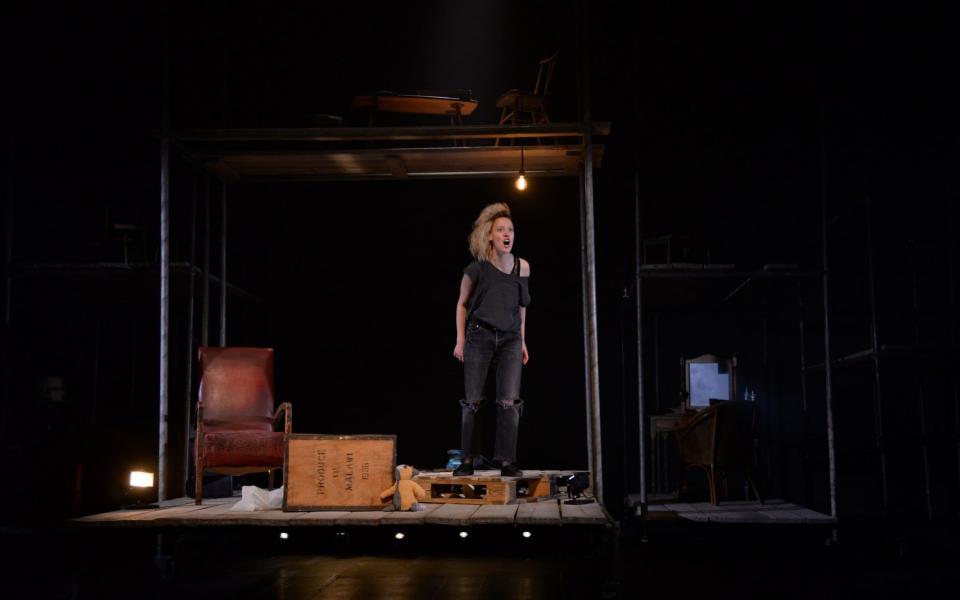Decades, Leeds Playhouse, review: Simon Armitage, Thatcher and the Yorkshire Ripper

- Oops!Something went wrong.Please try again later.
As Covid-19 restrictions are eased, tentatively, in England’s theatres, Leeds Playhouse (which is currently celebrating its 50th anniversary) has been quick out of the traps with Decades, a series of six newly created monologues for small, physically distanced audiences. The collection of mini-dramas, by six different writers, including Simon Armitage and Maxine Peake, are a diverse collection of tales set in Leeds and West Yorkshire in each decade from the 1970s forward.
Opening night brought us pieces from the 1980s, the 1970s and the turn of the millennium, in that order. First up, on the necessarily simple, scaffold-like set that serves all six plays, was Nicer than Orange Squash, Alice Nutter’s piece about Lorraine, a young, working-class woman who joins a squat in Leeds in the Eighties.
Lorraine (played engagingly by Isobel Coward) is infatuated by her new boyfriend “Gaz”, a seemingly charismatic squatter who expounds a dazzling array of political causes, from feminism to sabotaging fox hunts. The story that ensues involves Lorraine’s painful, but inevitable, discovery that her fellow squatters are drop-out children of rich parents with no more respect for her than Marie Antoinette had for the breadless masses.

Nutter does a reliable line in squat comedy (obligatory veganism, pooled dole money), but 1980s sitcom The Young Ones this is not. Like many a theatrical monologue, the piece seems rather static, as if it were a reading of a prose fiction.
In certain moments, Evie Manning’s production breaks through the fourth wall, very demonstratively drawing attention to itself as a work of theatre. This is, presumably, intended to lend the piece some dynamism. However, these interventions are so obvious that they only serve to underline this one-woman show's general lack of lustre.
There is, by contrast, little lacking in The Bodyguard, Simon Armitage’s playlet set in 1979. The recent election of the Thatcher government is but a backdrop for Wilf, a teenage boy from West Yorkshire, whose life is dominated by the ongoing crimes of Peter Sutcliffe, the so-called “Yorkshire Ripper”.
Thanks to the laziness of his largely sedentary father, Wilf has joined the legions of Yorkshire men and boys who have become de facto bodyguards to female relatives. With his sister seemingly confined to her bedroom, the teenager escorts his mother home from the bus stop.
In channelling this story through a teenage boy, Armitage has hit upon a fascinating angle on this horrifying episode in modern British history. Young Connor Elliott brings a fabulous combination of disturbed innocence, solid decency and effortless Yorkshire humour to his character. He is matter-of-fact in acknowledging that his reading of the tabloids, with their lurid descriptions of Sutcliffe’s heinous methods, probably hasn’t done him any good.
Tightly directed by James Brining, this is deceptively simple writing, with a genuinely powerful undertow.
Opening night closed with Leanna Benjamin’s The Unknown. Sophia (played with great emotional commitment by Nicole Botha) is a young woman who looks at the coming new millennium celebrations with the same desire to “party like it’s 1999” as her peers.
However, living with a degenerative illness which has, on this evening, immobilised her, Sophia’s hedonism is cruelly curtailed. Instead she is left to reflect on the insufficient support systems and social isolation that blight her life.
Directed by Amanda Huxtable, the piece is both undeniably moving and questioning of our present system of social care.
Until May 29. Info: leedsplayhouse.org.uk

